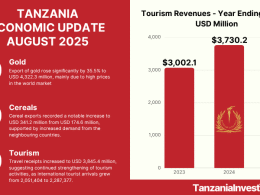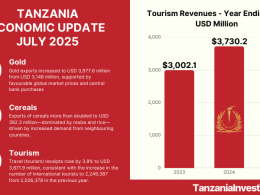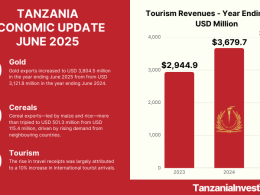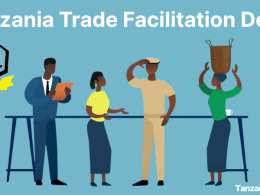TanzaniaInvest had the pleasure to interview H.E. Giuseppe Sean Coppola, Ambassador of Italy to Tanzania, to discuss the scope and evolution of Italy–Tanzania diplomatic and trade relations.
Ambassador Coppola discusses recent milestones, such as Tanzania’s inclusion in Italy’s Mattei Plan for Africa and new cooperation agreements, and outlines priority areas for collaboration.
He highlights Italian investment and expertise in sectors including agriculture, agri-business, renewable energy, digitalization, the blue economy, and tourism, as well as joint institutional efforts to increase trade, technology transfer, and value addition within Tanzania’s economy.
This interview provides insights for Italian businesses seeking opportunities in Tanzania and for Tanzanian stakeholders interested in expanding partnerships with Italy.
TanzaniaInvest: Could you give an overview of the current state of diplomatic relations and development cooperation between Italy and Tanzania?
H.E. Giuseppe Sean Coppola, Ambassador of Italy to Tanzania: Italy and Tanzania have maintained diplomatic relations since 1961, the year Tanganyika gained independence. This year [2025] marks the 60th anniversary of our first bilateral agreement for technical cooperation, signed in Dar es Salaam on 4 August 1965. That agreement laid the foundation for many initiatives in both development and trade.
Recently, Tanzania was included among the priority countries for Italy’s Mattei Plan for Africa, launched by the Italian government to strengthen cooperation and promote development based on authentic partnership. Tanzania’s inclusion, communicated in January 2025 by H.E. Prime Minister Giorgia Meloni to H.E. President Samia Suluhu Hassan, is an important milestone, and we are now working with the Tanzanian government to define priority initiatives for support and implementation.
“Tanzania was included among the priority countries for Italy’s Mattei Plan for Africa, launched by the Italian government to strengthen cooperation and promote development based on authentic partnership.”
Additionally, last year, Tanzania became a priority country for the Italian Development Cooperation. Italy has reaffirmed its commitment to strengthening bilateral relations, including through several development cooperation projects in the blue economy, vocational training, and health.
Another recent development is the signing of a bilateral Memorandum of Understanding in the field of defense, signed in Rome at the end of March 2025, by Hon. Minister Stergomena Tax and Hon. Minister Guido Crosetto. This agreement will strengthen cooperation in security and defense through capacity building and training.
There is also a strong presence of Italian companies and NGOs in Tanzania across different sectors. Italian investment in Zanzibar is notable: Italy was the first country to invest in Zanzibar as a tourist destination in the early 1990s, and Italian investors continue to support the sector, as seen with the recent opening of the Bawe Island resort by Cocoon Collection. The luxury hotel blends top-quality Italian design, the wise use of local materials, and state-of-the-art environmental practices.
Besides tourism, which other economic sectors show strong growth potential for Italian–Tanzanian collaboration?
Agri-business remains a major sector, both for trade and investments, and the Italian involvement in Tanzanian agriculture is expanding. Italian companies such as SDF Group, one of the world’s leading manufacturers of agricultural machinery, are expanding their presence in Tanzania.
“Agri-business remains a major sector, both for trade and investments, and the Italian involvement in Tanzanian agriculture is expanding [and] Italian investments in the agricultural sector can contribute to adding value and strengthening local skills.”
Local wine production is an inspiring example of Italian know-how. Over the years, Cetawico, based in Dodoma region, introduced advanced Italian wine-making techniques and technology. This has resulted in the production of high-quality wine and sparkling wine in Tanzania, employing and training local staff with Italian expertise. This is “Made in Tanzania wine,” thanks to Italian investments and know-how, strengthening the wine value chain in Tanzania.
New investments include a €100 million project by an Italian-led consortium, which will be another new opportunity to transfer Italian technology and build capacities in Tanzania. Italian investments in the agricultural sector can contribute to adding value and strengthening local skills.
The Italian Agency for Development Cooperation (AICS) is working with the relevant Tanzanian authorities on modernizing and revitalizing the Tanzanian coffee value chain. This is a regional initiative aimed at introducing modern techniques, improving sustainability, and strengthening capacity in production and processing. Italian coffee companies such as Illy and Lavazza are involved in increasing value addition within Tanzania.
The blue economy is also a focus area for Italian cooperation, given Italy’s expertise in technology and skills. Italian imports from Tanzania include fish and seafood from Lake Victoria and the Indian Ocean. The Italian Cooperation plans to implement a €4 million project in the blue economy in Zanzibar.
“The blue economy is also a focus area for Italian cooperation, given Italy’s expertise in technology and skills.”
Besides tourism and agri-business, other sectors are emerging. Renewable energy and digitalization are gaining interest due to Tanzania’s needs and the expertise of Italian companies. There is also activity in mining, with at least one Italian company involved. in
“Besides tourism and agri-business, other sectors are emerging. Renewable energy and digitalization are gaining interest due to Tanzania’s needs and the expertise of Italian companies.”
What are the latest data and trends on bilateral trade between Italy and Tanzania?
Italy is one of Tanzania’s long-standing trading partners, with bilateral trade exceeding €235 million in 2024. However, we are fully aware that there remains significant potential to further strengthen trade relations, given the strong complementarity between our two economies across multiple sectors.
“Italy is one of Tanzania’s long-standing trading partners, with bilateral trade exceeding €235 million in 2024. However, we are fully aware that there remains significant potential to further strengthen trade relations.”
In 2023, Italy ranked as Tanzania’s 22nd export destination and 13th largest supplier, while Tanzania ranked as Italy’s 110th export destination and 112th supplier. Over the years, trade between the two countries has grown and diversified.
In 2024, Italy imported goods worth €76.5 million from Tanzania, primarily raw materials, agricultural products, and processed fish and seafood. In the same year, Italy’s exports to Tanzania totalled €158.8 million, mainly consisting of machinery, chemicals, pharmaceuticals, and food products.
The Embassy of Italy and the Italian Trade Agency (ITA) remain strongly committed to further enhancing trade ties, recognising the vital role of economic diplomacy in advancing bilateral relations.
What was the focus and outcome of the most recent Italy–Tanzania Business Forum held in February 2025 in Dar es Salaam?
The main focus areas were agri-food, blue economy, sustainable infrastructure—including waste-to-energy and mining—and digitalization, as well as health and pharmaceuticals. The forum was organized with the Tanzanian Investment Centre (TIC), Zanzibar Investment Promotion Authority (ZIPA), and the Ministry of Foreign Affairs and East Africa Cooperation, ensuring participation from both mainland and Zanzibar authorities.
The event brought together Italian and Tanzanian companies for approximately 500 B2B meetings over two days. Several Italian business associations took part in the Forum, including Confindustria Assafrica & Mediterraneo; the National Association of Private Construction Contractors (ANCE); the Agricultural Machinery Manufacturers Federation (FEDERUNACOMA); and the Automatic Packing and Packaging Machinery Manufacturers Association (UCIMA). While it is difficult to measure immediate outcomes, the forum facilitated direct contact and exchange between potential business partners.
On the institutional side, the Forum enabled very constructive government-to-government meetings. Participating Italian institutions included the Ministry of Foreign Affairs and International Cooperation, the Italian Trade Agency (ITA), Cassa Depositi e Prestiti (CDP)—the Italian Development Bank, the Italian Export Credit Agency (SACE), SIMEST—the entity supporting Italian investments abroad, and SACE’s counterpart entities. These discussions were also instrumental in identifying priority sectors and projects for future cooperation under the Mattei Plan.
Whilst acknowledging the efforts being carried out by the Tanzanian authorities to improve the business environment in the country, the Business Forum was also a useful opportunity to discuss some of the challenges that Italian investors have to face. Key issues raised by Italian companies include the fiscal environment—including differences between mainland Tanzania and Zanzibar—land tenure issues, and administrative procedures for foreign investment authorization. The Business Forum was also an opportunity to engage with the Tanzanian authorities on these challenges, encouraging them to further strengthen their efforts to improve the business climate in Tanzania, fully recognizing the crucial role of the private sector for socioeconomic development, in Tanzania as in Italy.
These forums have become a regular feature, held alternately in Tanzania and Italy each year. Following the 4th Business Forum, the 5th edition is expected to take place in Italy in 2026, with the involvement of government institutions, the private sector, academia, and sectoral confederations.
“Following the 4th Italy-Tanzania Business Forum [in Dar es Salaam in 2025], the 5th edition is expected to take place in Italy in 2026, with the involvement of government institutions, the private sector, academia, and sectoral confederations.”
Another major recent event is the high-level meeting in Rome on 20 June 2025, focused on synergies between the Mattei Plan and the EU Global Gateway, with special attention to the Lobito Corridor. We are very pleased that H.E. Vice President Philip Mpango represented President Samia Suluhu Hassan in this event, co-chaired by Prime Minister Giorgia Meloni and the President of the European Commission, Ursula von der Leyen. The event allowed a very constructive dialogue on some strategic joint initiatives, such as the Lobito Corridor (and its complementarities in Tanzania), the possible extension to Tanzania of the Blue Raman digital connectivity cable, and the launch of the Rome-based Artificial Intelligence Hub for Sustainable Development.
What initiatives is the Italian Government and Embassy supporting to promote business and investment?
The Embassy, along with ITA, supports a range of initiatives to facilitate business between Italian and Tanzanian companies, and supports Tanzanian companies’ access to the Italian and broader European Union markets, as recently demonstrated by Tanzanian participation in the Macfrut Fair and technology transfer projects.
“The Embassy, along with the Italian Trade Agency (ITA), supports a range of initiatives to facilitate business between Italian and Tanzanian companies, and supports Tanzanian companies’ access to the Italian and broader European Union markets.”
SACE and CDP also support projects with implications for both Italian and Tanzanian businesses.
In April 2025, SACE approved financing to support the construction of the Standard Gauge Railway (SGR) in Tanzania. Additionally, SACE finalized a “push strategy” operation with MeTL Group, one of Tanzania’s largest private groups, to strengthen ties and promote technology transfer between Italian firms and Tanzanian businesses.
Italy is also supporting digital infrastructure development. As mentioned before, one project under consideration is the Blue Raman cable. The initiative–co-funded by the European Commission and supported by Italian digital infrastructure leader Sparkle–will enhance digital connectivity between Tanzania and Italy, as part of a wider network connecting India to the Mediterranean, and support technological convergence between Europe, Africa, and India.
“Italy is also supporting digital infrastructure development, [and] one project under consideration is the Blue Raman cable [that] will enhance digital connectivity between Tanzania and Italy.”
We aim to ensure a comprehensive and systematic approach in our economic and cultural diplomacy efforts. With this spirit, the Embassy of Italy has also been supporting, over the years, the cultural or creative industries, like the Swahili Fashion Week, in order to strengthen collaboration between Tanzanian and Italian designers.
In addition, the Italian government funds scholarships for Tanzanian students, selected through a competitive process. The European Union Erasmus programme also supports professor exchanges between Italian and Tanzanian universities, further strengthening academic links between the two countries.
Our efforts are closely coordinated and complementary to the many European Union initiatives in Tanzania, particularly in promoting business opportunities, technology transfer, and modernization of various sectors. The EU’s Global Gateway programme is active across Tanzania, including Zanzibar and Pemba, with a range of projects aimed at infrastructure and business development.
How would you describe Tanzania to Italian potential business partners and investors?
Tanzania is a country with great geographic diversity and resources, from mountains and lakes to coastlines and islands. Its long history of stability and peace since independence in 1961 is a major asset for investors, providing a solid foundation for future growth. But the most important and valuable treasure of Tanzania is its wonderful young and dynamic people, full of energy and talent.
Tanzania serves as a regional hub, connecting East, Central, and Southern Africa, and its ports are crucial for trade with landlocked countries. Zanzibar’s development as a logistics hub in the western Indian Ocean is also notable. In the last years, the Tanzanian government has worked to strengthen the private sector’s role in the economy and progress towards a private sector–led economic development model.
What would you like Tanzanians to know about Italy’s relationship with their country?
Italy has deep roots in Tanzania, going back to before independence. Italians admire Tanzania and enjoy working here. Italy played a crucial role in launching Zanzibar as a tourist destination and continues to support investment and business in both Zanzibar and mainland Tanzania. Italians choose Tanzania every year as a tourist destination, visiting the amazing national parks such as Serengeti and Ngorongoro. Italian companies are keen to invest in quality and sustainable projects in Tanzania, with a focus on skills transfer and job creation for young people.
“Italians admire Tanzania and enjoy working here. Italians choose Tanzania every year as a tourist destination. Italy considers Tanzania a strategic partner and friend. We are committed to expanding cooperation across sectors, focusing on quality, sustainability, and mutual benefit[…] with no hidden agendas and a spirit of true partnership.”
The main message is that Italy considers Tanzania a strategic partner and friend. We are committed to expanding cooperation across sectors, focusing on quality, sustainability, and mutual benefit. With no hidden agendas and a spirit of true partnership.










